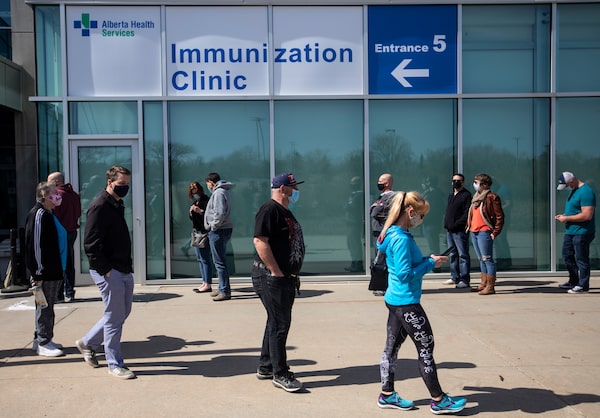
People line up outside an immunization clinic to get the Oxford-AstraZeneca COVID-19 vaccine in Edmonton, on April 20, 2021.JASON FRANSON/The Canadian Press
Canadians who move between provinces or relocate temporarily face a confusing set of rules about if, or when, they can get vaccinated against COVID-19, which experts say could delay some from getting immunized.
Provinces such as B.C. are vaccinating any eligible person living there. This contrasts with jurisdictions such as Alberta and Manitoba that could require documents proving how long someone has been in the province. They could also ask non-residents to wait up to three months to book an appointment.
Inconsistent policies across the country are leaving some Canadians waiting longer than necessary to receive their vaccine. Anita Ho, a bioethicist and health-services researcher, said regardless of where a Canadian lives in Canada, they should have access to a vaccine.
“The Canada Health Act says that all Canadians and residents should be able to get health care,” Dr. Ho said.
“We are in a pandemic. We have an emergency situation. There seems to be no good reason to think about how residency should be a barrier for people to get vaccinated.”
Canada vaccine tracker: How many COVID-19 doses have been administered so far?
Dr. Ho said that the Canada Health Act requires provinces to ensure portability so people can access urgent care if they are absent from their home province. In general, someone who moves to another province must wait three months before applying for health coverage; in the interim, they are covered by the province they left.
She said that from a fairness standpoint, if one province is vaccinating people from out of province, the act should be reciprocated.
“There should be no isolated provinces that would say no,” Dr. Ho said.
B.C. offers the vaccine to anyone living in the province and does not require a B.C. health card, or any documents proving Canadian citizenship, said Marielle Tounsi, senior public-affairs officer for B.C.’s Ministry of Health.
Vaccines are booked through an online service, but people without a card can register by phone or in person at a Service B.C. office. Eligible registered candidates receive a temporary reference number that they present at their vaccine appointment. People who have received their first COVID-19 vaccine dose in another province can get their second dose in B.C.
In Alberta, any non-permanent residents need to live in the province for at least three months to be able to get the vaccine. Pharmacists or vaccination clinics may request written documents that prove how much time a person has spent in the province. However, Tom McMillan, assistant communications director for Alberta Health, said the documents are not required because the province is “operating on the honour system.”
Undocumented residents in the province need to register with Alberta Health Services, which will issue them a unique lifetime identifier to track immunization records.
Officials in Manitoba say that anyone who has been in the province for a month can be immunized, but pharmacists and vaccine clinics don’t need any official documents proving the length of stay. Non-residents will be asked for a form of identification so the province can track these vaccinations, said Joss Reimer, medical lead of Manitoba’s vaccine task force. However, the province has no way to prove if a person has had their first dose in another province.
“They will be asked to self-declare,” Dr. Reimer said. Manitoba is currently prioritizing giving first doses of the vaccine to all eligible Manitobans.
The Ontario government says on its website that anyone without an Ontario health card is eligible for the vaccine and suggests contacting a local public-health unit where they will ask for another form of identification and confirm eligibility.
A person can also call a pharmacy to book a second dose if the first shot was received in another province. The pharmacy may ask for information about the vaccine, where it was given and when, but the website doesn’t list if this information can disqualify a candidate. There is also no mention of how long someone needs to be in Ontario to be considered eligible for the shot.
On the east coast, Nova Scotia offers vaccines to anyone living in the province, regardless of how long they lived there. The province will offer second shots to people who had their first dose in another province, though, like most provinces, it is focusing on first doses right now. Marla MacInnis, media-relations adviser for the province’s health and wellness department, said the province will release more info on how people from outside Nova Scotia can book second shots later.
Nova Scotia recommends booking an appointment by phone if an eligible candidate doesn’t have a Nova Scotia health card, she said.
Sign up for the Coronavirus Update newsletter to read the day’s essential coronavirus news, features and explainers written by Globe reporters and editors.
Editor’s note: A previous version of this story incorrectly said Nova Scotia will not offer second doses of COVID-19 vaccines to people who had their first dose in another province. In fact, the province does plan to offer second doses in such cases.